Oracle APEX: Enterprise-grade Application DevelopmentLearn more
Top 11 Use Cases for Oracle APEX in the Enterprise
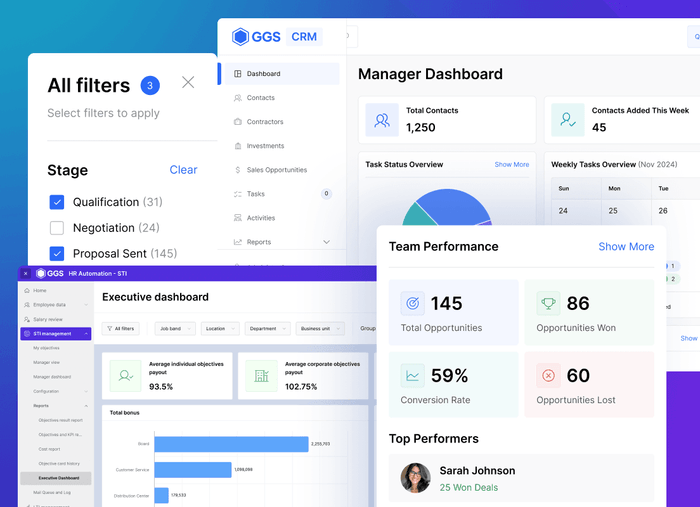
Low-code platforms are transforming software delivery—making it faster, easier, and more cost-effective to build business-critical applications. Unlike many tools that fall short in enterprise back offices, Oracle APEX stands out as a powerful way to enhance complex processes. Running natively on Oracle Database, it combines low-code speed with enterprise-grade scalability, security, and system integration.
In this article, we’ll explore 11 Oracle APEX example projects—from manufacturing and logistics to finance and compliance—showcasing how GGS IT Consulting and global enterprises create new value with APEX.
Oracle APEX: low-code at enterprise scale
Built for enterprise-class applications, Oracle APEX is secure, scalable, and cost-effective. It enables IT teams to deliver complex solutions quickly without sacrificing performance or governance. Applications can run anywhere—on-premises, in Oracle Cloud Infrastructure, or in hybrid environments. Pre-built components, templates, and connectors further accelerate development and reduce costs.
11 enterprise-grade applications built with Oracle APEX
Oracle APEX for enterprise applications goes far beyond dashboards and forms. Its flexibility makes it ideal not just for departmental tools, but for mission-critical systems across industries. Whether replacing legacy platforms, extending ERP with compliance apps or production planning systems, or enabling advanced reporting, APEX proves that low-code can deliver at enterprise scale. Here are 11 Oracle APEX example apps commonly used among Oracle users.
1. CRM system: boosting sales despite market slowdown
Why build a CRM from scratch when so many off-the-shelf tools exist?
Because every enterprise has unique back-office intricacies that standard CRMs can’t handle. With ERP and other system integrations, even small errors can cascade into major inefficiencies. Oracle APEX makes it possible to create tailored modules that transform a static deal database into a full-fledged CRM—fast.
Who: GGS IT Consulting delivered a custom CRM for Lindab, a global air-conditioning and ventilation manufacturer operating in 20 markets with over 4,500 employees.
Challenges:
- Standard CRM with limited customization ended up functioning as meeting calendars with notes.
- Sales data was scattered across tools, spreadsheets, and email threads.
- Management lacked visibility into deal timelines, SDR performance, and sales lifecycle stages.
- Opportunities were slipping through the cracks due to the absence of a structured process.
- Without proper reporting, forecasting was impossible, hurting business predictability.
Benefit With Oracle APEX, GGS IT transformed Lindab’s limited booking system into a robust CRM that:
- Unified all sales inquiries and historical data from multiple sources into one view.
- Delivered full visibility into each deal with detailed order history at every stage—helping sales teams work more efficiently.
- Enabled accurate sales forecasting, giving management confidence and predictability.
- Boosted sales despite an industry slowdown, proving ROI even in challenging market conditions.
- Became an essential daily tool for Lindab’s sales organization, enabling teams to process more offers simultaneously—resulting in more chances to close deals.

2. Production planning: From spreadsheets to integrated forecasting
Why digitize production planning when spreadsheets “work”?
Because scattered data across Excel files, ERP modules, and inventory systems exposes production planning to costly errors and consumes hundreds of hours each month. With Oracle APEX, enterprises can integrate all sources into a single application—reducing manual effort and improving forecasting accuracy.
Who: GGS IT Consulting built a custom production-planning and forecasting application for one of Europe’s leading beef producers, supplying products to over 60 countries.
Challenges:
- Production planning used to require moving data between spreadsheets and cross-checking with a separate stock management system.
- Manual data transfer between ERP (Impuls EVO), spreadsheets, and emails increased the risk of errors.
- Without a single source of truth, forecasting relied on guesswork rather than data.
- The internal IT team lacked the capacity and advanced APEX expertise to deliver such a complex system.
Benefit The new fully integrated production-planning module provides clear order visibility, daily planning reports, a queuing feature for large orders, due-date calculators, and forecasting tools that support both production scheduling and financial planning.
Business value delivered:
- Hundreds of hours saved monthly by eliminating manual spreadsheet work.
- All planning data unified in one application.
- Better insight into seasonal fluctuations and more accurate forecasting and budget planning.
- Higher productivity of the production-planning team.
- Faster order-to-production cycle, reducing errors, and improving predictability.
3. MES (Manufacturing Execution System)
Spreadsheets, punch-in/punch-out records, payroll data, and ERP modules don’t connect by themselves. For manufacturers, this fragmentation creates inefficiencies, errors, and hidden costs. With Oracle APEX, you can unify these data sources into a single application—improving visibility, efficiency, and predictability across the factory floor.
Who: GGS IT Consulting partnered with Brintons Agnella, one of Europe’s leading luxury rug manufacturers with a 50-year history and around 550 employees working in a 24/3 shift system.
Challenges:
- Production data scattered across multiple systems (ERP, payroll, punch-in and -out times, other manufacturing departments data).
- Lack of real-time visibility into labor efficiency, equipment performance, and capacity planning.
- Manual processes made it difficult to track costs per machine or employee hour.
- Tight timelines, limited budget, and COVID restrictions complicated project delivery.
Korzyści: GGS IT Consulting built a custom Manufacturing Execution System (MES) on Oracle APEX that unified operational data across departments. The MES quickly became a core tool for Brintons Agnella, enabling lean manufacturing practices and cost optimization.
Despite constraints, the system delivered measurable improvements:
- Increased labor efficiency and better manpower planning.
- Higher OEE (Overall Equipment Effectiveness) through real-time monitoring of bottlenecks.
- Improved cost control with tracking per machine and per employee hour.
- Reduced hiring costs by optimizing workforce allocation.
- Faster identification of efficiency and equipment issues, preventing downtime.
- Enhanced capacity planning and optimization, boosting productivity across shifts.
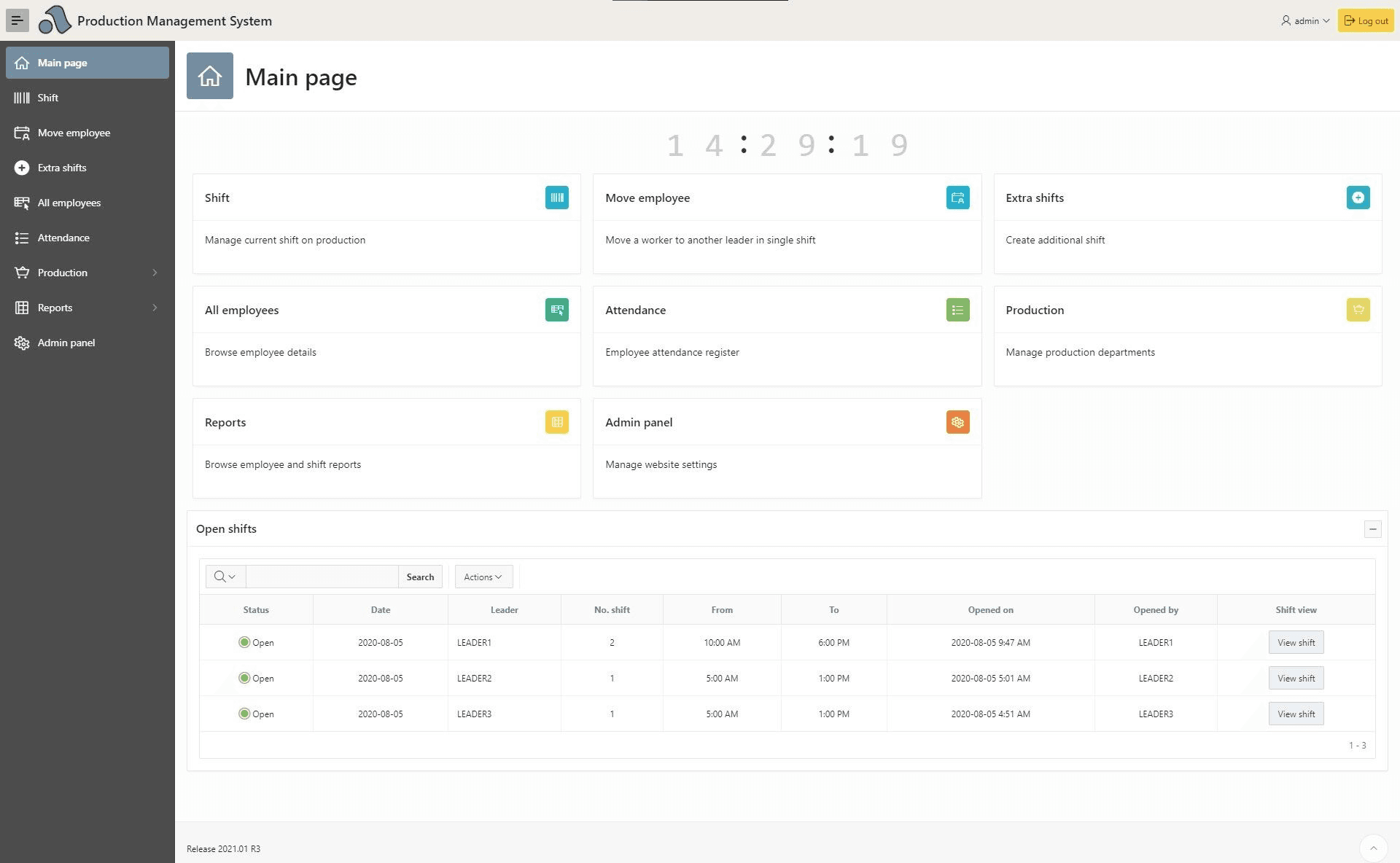
4. Complaint management system
A complaint management system is essential to keeping unhappy customers satisfied—without overwhelming support teams. Oracle APEX, enterprises can centralize all complaint workflows into one platform and automate the process—improving response times, traceability, and customer satisfaction.
Who: GGS IT Consulting developed a custom complaint management system for a leading European producer of inks, dies, and cutting tools, supplying products worldwide.
Challenges:
- Over 1,200 complaints per year across multiple product groups and complaint types (product, transport, administrative).
- Data split between ERP Impuls and email threads, leading to silos and incomplete records.
- No central repository to track complaint history, documents, or laboratory test results.
- Limited reporting and analytics made it difficult to identify trends, root causes, and bottlenecks.
- Frequent delays caused by incomplete submissions, lack of data standards, and a complex verification process.
Benefit: The new complaint management system, built on Oracle APEX and fully integrated with ERP Impuls, delivers: Improved efficiency through reduced manual follow-ups and centralized data.
- Faster resolution times, positively impacting customer satisfaction.
- Fewer complaints overall, thanks to reporting and trend analysis that enables root-cause detection and prevention.
- Better coordination between departments.
- Increased customer confidence through a self-service portal where clients can register and track complaints.
- Overall improvement in customer satisfaction.
5. Auditing & Compliance Tools
As enterprises face strict compliance requirements—especially in industries where product safety is critical—the auditing process can easily become a major bottleneck. With Oracle APEX, you can build an auditing app that streamlines compliance checks. An Argentine multinational food company did exactly that, developing a system in just a few months that integrates IT service management with its database applications. The new solution is fully traceable, providing real-time insight into incidents, approvals, and fixes while managing over 1,500 SQL sentences monthly. Tasks that once took weeks now take minutes—reducing data-fix incidents by 30%, boosting application performance by 8%, and ensuring both compliance and greater transparency for external auditors.
Who: Grupo Arcor, an Argentine multinational food company producing 3 million kilograms of products daily across 40 plants in Latin America
Challenges:
- Compliance auditing relied on disconnected systems.
- No unified process to track incidents, approvals, and resolutions.
- Slow reporting with investigations into incidents often taking up to two weeks.
- Lack of real-time traceability created risks for compliance and external audits.
- Time pressure to deliver a scalable solution in just a few months.
Benefit
Using Oracle APEX on Oracle Database Cloud Service, Arcor built a service and auditing app in just a few months that:
- Integrated IT service management with database applications for seamless workflows.
- Full traceability from incident creation to resolution with over 1,500 SQL sentences handled monthly.
- Investigation times cut from weeks to minutes thanks to automated auditing processes.
- 30% reduction of data-fix incidents.
- 8% application performance boost, increasing productivity.
- Improved transparency for external auditors with real-time access to compliance records.
6. Workforce scheduling
Manual processes for workforce scheduling—covering safety audits, training, skills and certifications, fleet management, and payroll—are time-consuming, error-prone, and hard to scale. Oracle APEX helps enterprises automate these back-office workflows, freeing employees to focus on higher-value tasks and ensuring greater confidence that work scheduling aligns with safety requirements.
Who: West Tree, a 75-year-old tree removal company, used Oracle APEX and Oracle Cloud to develop an app for managing and scheduling workforce.
Challenges:
- Ensuring employee certifications and safety records are up to date to avoid work interruptions.
- Inefficient processes for maintaining safety records.
- Lack of a structured mechanism to manage safety data.
- Productivity losses caused by time spent traveling for onsite training.
- Time-consuming reporting processes that delayed operational insights.
Benefit: With Oracle APEX, West Tree delivered the first module of its Crew Management System (CMS) in just 30 days, later expanding it with safety, fleet, payroll, and communications features. The CMS reduced manual work, accelerated reporting, and boosted productivity—helping West Tree run safer, more efficient field operations while keeping costs under control.
- Automated certification tracking ensured compliance and prevented delays.
- Safety and training modules improved workforce safety and minimized downtime.
- GPS-enabled fleet management optimized vehicle use, prevented theft, and increased accountability.
- Real-time reporting replaced manual data collection and sped up insights.
- Payroll and communication modules streamlined back-office processes and kept crews better informed.
Thinking of using Oracle APEX? Follow these best practices

7. Infrastructure Lifecycle Management
Most data center managers use multiple tools to oversee storage, compute, networks, and more—each with its own dashboards and reports. Fragmented, complex sprawl makes it hard to see the big picture. Oracle APEX can help by unifying all those metrics into a flexible and customizable business intelligence tool. Vodafone Group built an APEX solution that streamlined infrastructure provisioning, lifecycle management, and reporting across its European data centers. As a result, the company gained a single source of truth, faster insights, and the flexibility to adapt quickly to stakeholder needs.
Who: Vodafone Group, responsible for European IT infrastructure spanning multiple data centers, used Oracle APEX to replace disparate reporting systems with a single, standardized platform for provisioning, lifecycle management, and reporting.
Challenges:
- A fragmented, complex infrastructure management process scattered across multiple siloed tools.
- No data governance system that would standardize KPIs, dashboards, and reports across different HTML pages.
- No single source of truth for stakeholders, slowing decision-making.
Benefit: Vodafone now runs a unified, enterprise-wide platform that provides full visibility into its European IT infrastructure—boosting governance, decision-making, and operational efficiency. A centralized platform:
- Consolidated reporting systems into a single, standardized data structure.
- Streamlined infrastructure provisioning and lifecycle management for storage, databases, and rack space.
- Delivered a single source of truth, eliminating inconsistencies across systems.
- Enabled quick adaptation to stakeholder needs, improving agility.
8. Salary and compensation management
Managing employee pay, bonuses, and adjustments across spreadsheets and disconnected systems creates risks: errors in calculations, lack of transparency, and compliance issues. For large organizations, the complexity grows with every payroll cycle, often resulting in delays. Oracle APEX can centralize compensation management into one secure, auditable system.
Who: Enterprises looking to simplify compensation processes and reduce manual errors in HR and finance with CompCube, a dedicated solution for salary and compensation.
Challenges:
- Salary, bonuses, and adjustments managed across multiple spreadsheets and systems.
- Manual approvals prone to delays and errors.
- Lack of transparency and audit trails in compensation decisions.
- Compliance risk when processes aren’t standardized.
Benefit: With CompCube on Oracle APEX, organizations:
- Centralize salary and compensation data into one secure system.
- Automate approval workflows to ensure compliance with company policies.
- Gain transparency and traceability through built-in reporting.
- Reduce manual errors and administrative overhead.
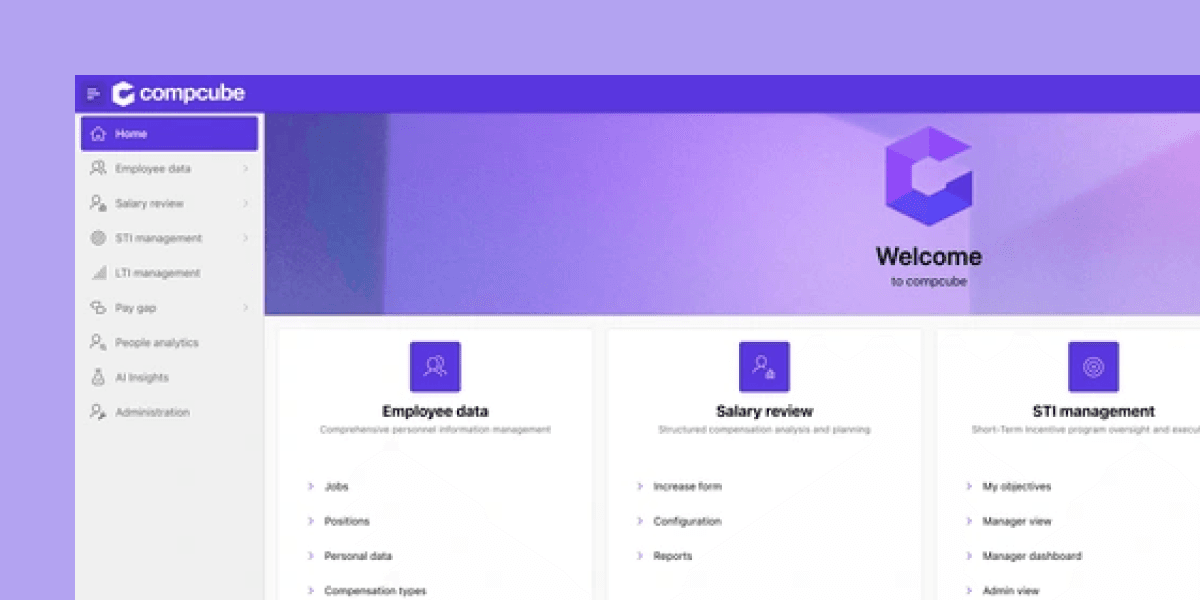
9. Employment forms
Paper-based HR forms and email chains slow down even the simplest processes—whether it’s applying for leave, filing an IT support request, or completing onboarding steps. Tracking approvals across inboxes leads to delays, errors, and frustration for both employees and managers. Oracle APEX enables companies to digitize these workflows, speeding up approvals and improving transparency.
Who: Organizations aiming to digitize HR processes such as leave requests, onboarding, IT support tickets, and feedback collection.
Challenges:
- Paper forms and email-based approvals slowing down processes.
- Data scattered across inboxes, hard to track and prone to errors.
- Lack of integration with HR systems creates manual re-entry of information.
- Delays in approvals and poor visibility into request status.
Benefit: With Oracle APEX, HR teams:
- Replace paper and email with digital forms that integrate directly with HR databases.
- Route requests automatically to the right stakeholders.
- Enable managers to approve faster with structured workflows.
- Reduce administrative overhead and ensure a smoother employee experience.
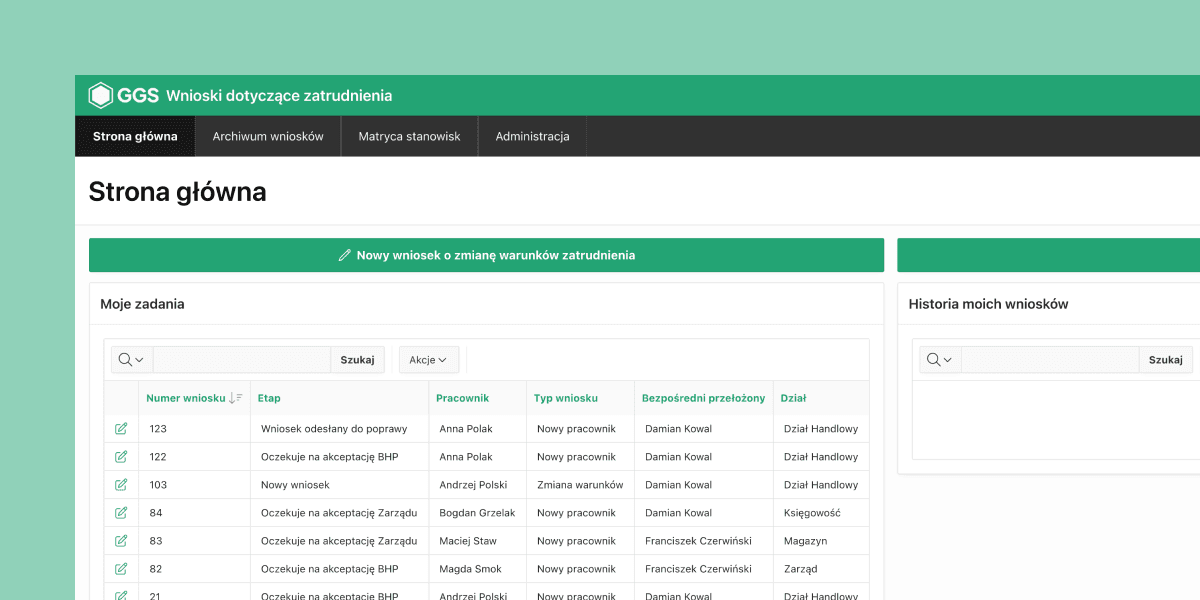
10. Training management
For HR teams, tracking employee training and certifications manually is both time-consuming and risky. Missing a renewal deadline for a compliance-critical certification can expose a company to regulatory penalties or operational downtime. By building a training management system in Oracle APEX, enterprises gain a centralized tool to manage development programs, certifications, and employee upskilling.
Who: Companies that need to manage employee training, certifications, and upskilling programs required in regulated environments.
Challenges:
- Manual tracking of training attendance and certifications across spreadsheets.
- Risk of expired certifications creating compliance issues.
- Limited visibility for managers into employee development progress.
- High administrative burden on HR staff.
Benefit: With a training management platform built on Oracle APEX, enterprises:
- Centralize all training programs, sessions, and certifications in one system.
- Allow employees to self-register and track their learning history.
- Send automated reminders for upcoming sessions and expiring certifications.
- Give managers clear oversight of workforce skills and development.
- Reduce compliance risk while boosting workforce capability.
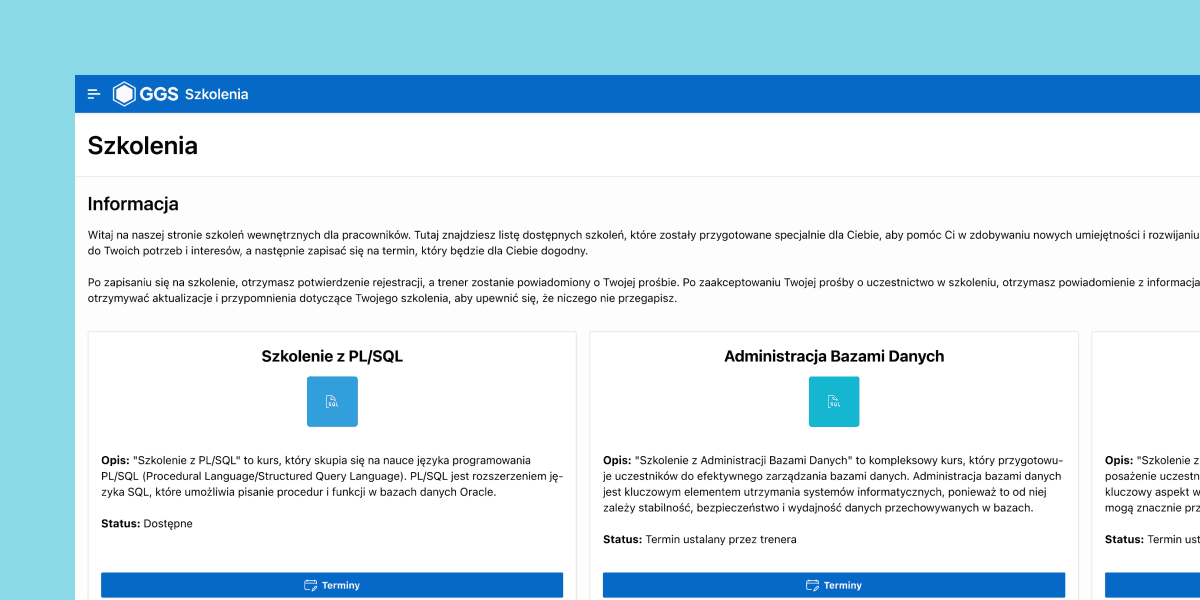
11. Data visualization and BI dashboards
Data on its own doesn’t drive decisions—insights do. But when metrics are hidden in raw database tables or siloed BI tools, decision-making slows down. Oracle APEX brings powerful visualization and business intelligence capabilities directly on top of Oracle Database, allowing enterprises to build interactive dashboards, reports, and charts without complex integrations.
Who: Any enterprise department—finance, operations, sales, or HR—looking to turn Oracle Database data into actionable insights.
Challenges:
- Raw and unstructured data difficult to interpret without visualization tools.
- Dependence on third-party tools adds cost and complexity.
- Delays in accessing real-time performance metrics.
- Limited ability to drill down and analyze trends.
Benefit: With Oracle APEX, organizations:
- Empower business users with self-service insights.
- Reduce reliance on IT teams.
- Access real-time KPIs and performance metrics empowering them to take data-driven decisions.
- Build dashboards, charts, and interactive reports directly on top of their Oracle Database.
- Can conduct deeper analysis and identify trends.
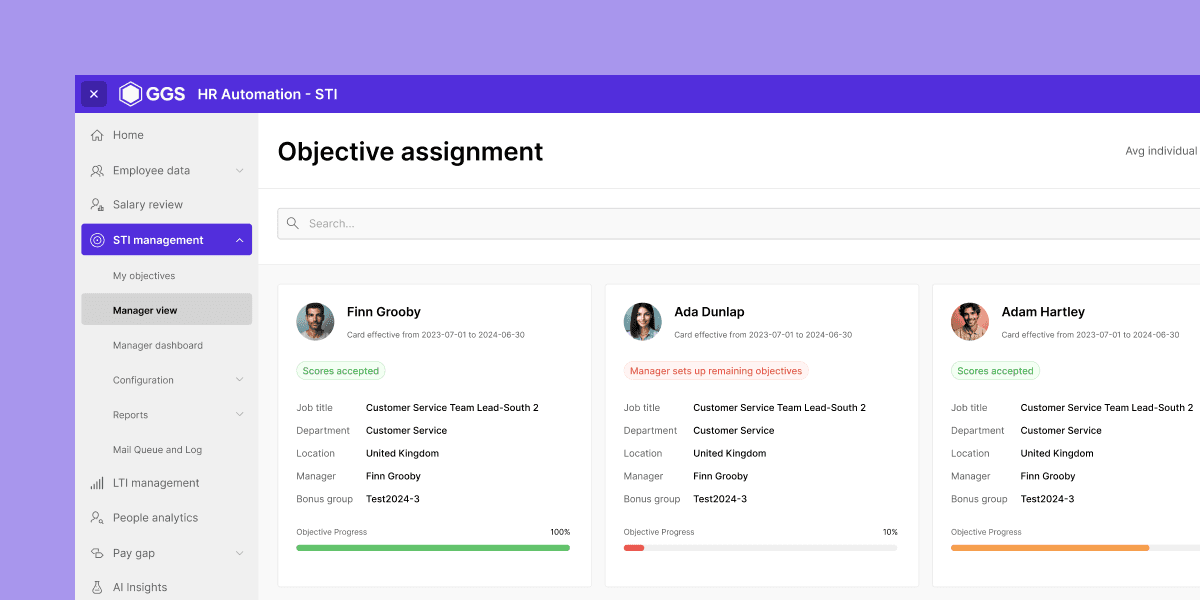
What would you build with Oracle APEX
Oracle APEX proves its value across the wide range of enterprise needs—from CRM and ERP extensions to compliance management, logistics, analytics, and HR support. It enables organizations to replace spreadsheets and manual workflows with secure, data-driven applications.
Have an app in mind already? Let’s chat!

